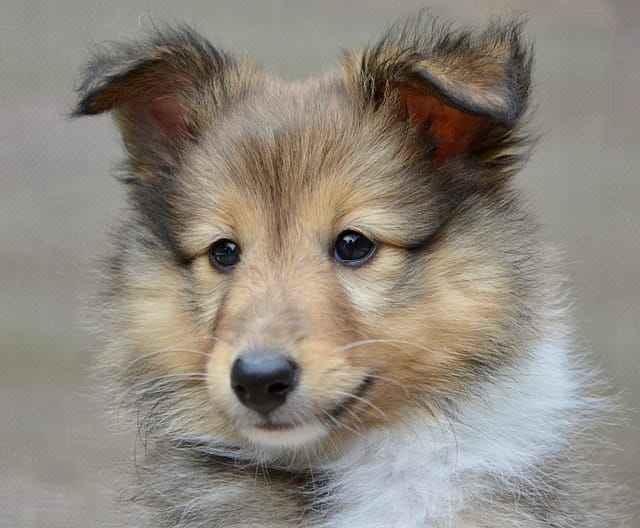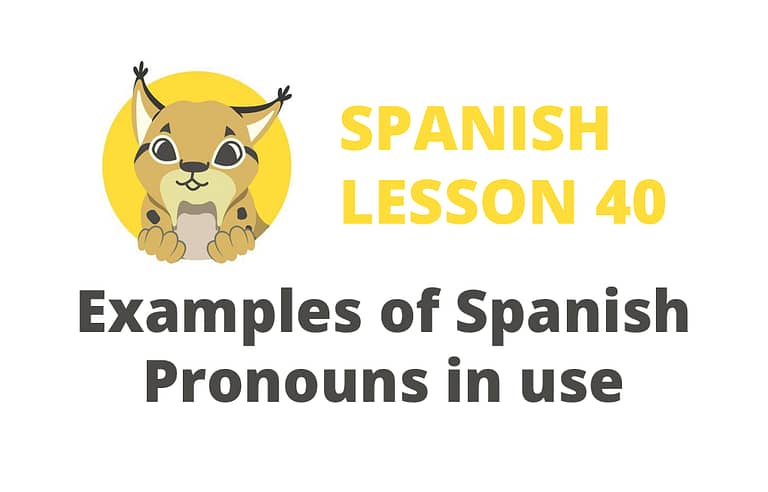This is the fortieth lesson in our beginner level Spanish course and we will look at Examples of Spanish Pronouns in use.
In lesson 38 we explained fundamental Spanish grammar terminology (verbs, adjectives, nouns, prepositions, etc) and in the previous lesson we focused on the various types of Spanish Pronouns. Pronouns are words which replace nouns and there are six different types of Spanish Pronouns. In this lesson we will see Examples of Spanish Pronouns in use from each of the pronoun categories.
Examples of Spanish Pronouns in use:
Pronombres Sujeto (Subject Pronouns): yo, tú, él/ella, nosotros/as, vosotros/as, ellos/ellas (I, you, he/she/it, we, you, they).
- Nosotros no queremos estudiar más: We don’t want to study anymore.
- Tú eras muy estudiosa de pequeña: You were very studious when you were young.
- Ellos vivieron en Salamanca durante doce años: They lived in Salamanca for 12 years.
Pronombres de Complemento Directo (Direct Object Pronouns): me, te, lo/la, nos, os, los/las (me, you, him/her/it, us, you, them).
- Tu hermana me llamó ayer: Your sister called me yesterday.
- La profesora nos ha castigado por hablar mucho en clase. The teacher has punished us for talking too much in class.
- Raquel y Pablo te han invitado a su boda: Raquel and Pablo have invited you to their wedding.

Pronombres de Complemento Indirecto (Indirect Object Pronouns): me, te, le, nos, os, les (me, you, him/her/it, us, you, them).
- Les voy a comprar un regalo: I am going to buy them a gift.
- Tu madre me dijo que estabas enfermo: Your mum told me you were sick.
- Os prestaré mi coche si me dais algo a cambio: I will lend you (all) my car if you give me something in exchange.
Pronombres Personales Preposicionales (Prepositional Personal Pronouns): mí, ti, él/ella, nosotros/as, vosotros/as, ellos/ellas (me, you, him/her/it, us, you, them).
- Esto es para ti: This is for you.
- A nosotros no parece bien: It seems good to us.
- Para mí, el español es un idioma muy interesante: For me, Spanish is a very interesting language.
Pronombres Relativos (Relative Pronouns): el que, la que, los que, las que, el cual, la cual, los cuales, las cuales, cuyo/cuya, cuyos/cuyas (who, which, that, whose).
- Hay personas cuyas vidas son muy peligrosas: There are people whose lives are very dangerous.
- Pedro, cuyo padre es el director de la empresa, es un vago: Pedro, whose father is the director of the company, is a lazy man.
- Nunca voy a olvidar a una persona cuyas palabras me han ayudado tanto: I will never forget a person whose words have helped me so much.

Pronombres Posesivos (Possessive Pronouns): mío/mía, míos/mías, tuyo/tuya, tuyos/tuyas, suyo/suya, suyos/suyas, nuestro/nuestra, nuestros/nuestras, vuestro/vuestra, vuestros/vuestras (mine, your, yours, his/hers/its/theirs, our, ours, your, yours).
- Me gustaría que Toby fuera nuestro, es un perro adorable: I would like that Toby was ours, he is an adorable dog.
- Esta falda es mía, no quiero que te la pongas. This skirt is mine, I don’t want you to wear it.
- La casa de Ana y Mario será suya cuando ellos mueran: Ana and Mario’s house will be his when they die.
Pronombres Reflexivos (Reflexive Pronouns): me, te, se, nos, os, se (me, you, him/her/it, us, you, them).
- Sonia y Lisa nunca se peinan: Sonia and Lisa never comb their hair.
- Mañana me voy a levantar muy temprano: Tomorrow I am going to get up very early.
- ¿Usted se siente bien?: Do you feel OK?
Pronombre Interrogativos (Interrogative Pronouns): ¿quién?, ¿quiénes?, ¿qué?, ¿cuál?, ¿cuáles? (who? what?, which?).
- ¿Quiénes eran los Reyes Católicos?: Who were the Catholic King & Queen?
- ¿Cuál es tu abrigo? ¿El marrón o el azul?: Which one is your coat? The brown one or the blue one?
- ¿Qué querías ayer? ¡Me llamaste diez veces cuando estaba en la cama!: What did you want yesterday? You called me ten times when I was in bed!
Pronombres Demostrativos (Demonstrative Pronouns): este/esta, ese/esa, aquel/aquella, estos/estas, esos/esas, aquellos/aquellas (this, that, that over there, these, those, those over there).
- Recuerdo aquellos maravillosos años, cuando éramos niños: I remember those wonderful days when we were children.
- Esta mañana no he hecho nada productivo: This morning I have done nothing productive.
- Esas personas nos están mirando con una cara extraña: Those people are looking at us with a strange face.




